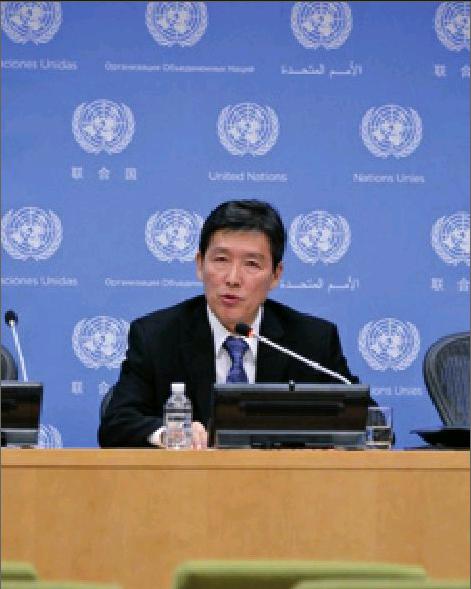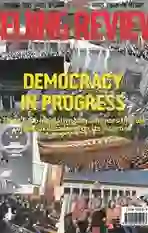Escaping Isolation
2014-10-11ByANGang
By+AN+Gang

In late August, the Democratic Peoples Republic of Korea (DPRK), also known as North Korea, informed the United Nations that its Foreign Minister Lee Yong Soo would attend the 69th Session of the UN General Assembly that will open in New York in late September. It has been 15 years since Pyongyangs top diplomat attended a UN General Assembly.
The unconventional arrangement is the latest in a string of subtle yet noteworthy moves recently taken by North Korea to improve its relationship with the United States.
It has been confirmed that a U.S. work team consisting of CIA and White House officials paid a secret visit to North Korea in August. During their 18-hour stay, U.S. officials spoke with North Korean authorities regarding U.S. citizen Kenneth Bae, who has been detained in North Korea since November 2012 on charges of“hostile acts against the DPRK Government.”
Hostage diplomacy
Apart from Bae, two additional U.S. citizens—Mathew Miller and Jeffrey Fowle—are in the hands of North Korean authorities. On September 1, the U.S. National Security Council and U.S. Department of State expressed concerns about the three U.S. citizens detained in North Korea and urged their release in separate statements. On the second day, CNN broadcasted the video of an interview with the three detainees. CNN said that its reporters went to the country to cover cultural events at the invitation of North Korea, and the interview came as a sudden arrangement by North Korean authorities without advance notice.
In the interview, the three detained Americans called upon the U.S. Government to send a special envoy to visit North Korea and secure their release as soon as possible. U.S. press believes DPRK authorities are using the hostages as bargaining chips to establish direct contact with President Barack Obamas administration, suggesting North Koreas willingness to engage with the international community.
North Koreas diplomatic signals have posed a challenge for the Obama administration, which has been criticized domestically for its perceived weakness in foreign policy. In light of this, Washington is unlikely to beg Pyongyang for the pardoning of the American detainees, let alone soften its tough policy stance.
However, the Obama administration might not want to miss out on the chance to rescue the U.S. citizens held in North Korea. It needs to make some diplomatic achievements to boost U.S. morale at a time of internal and external predicaments.
North Korea likely has three figures in mind for a U.S. special envoy: former U.S. President Bill Clinton, former U.S. President Jimmy Carter and former governor of New Mexico Bill Richardson. These three U.S. politicians played a special role in promoting a U.S.-North Korea relationship and all of them had visited North Korea for humanitarian purposes.
In August 2009, Clinton paid a private but “historic visit” to North Korea, during which he met with the late DPRK leader Kim Jong Il. Clinton returned with two American female reporters, Euna Lee and Laura Ling, who had been detained in North Korea. After returning to Washington, Clinton made a three-hour briefing of his visit in North Korea to President Obama, but did not put forward suggestions for improving U.S.-North Korea relationship.
In fact, tensions between North and South Koreas had eased somewhat at the end of Clintons presidential tenure, showing a glimmer of hope for normalization of the relationship between North Korea and the United States. As a result of the improved bilateral interaction, then U.S. Secretary of State Madeleine Albright paid a visit to North Korea in October 2000, but Clinton did not land in North Korea during his presidential tenure.
After George W. Bush replaced Clinton as president in 2001, he soon made an adjustment to U.S. policy toward North Korea. The normalization process was then shelved. Thereafter, North Korea insisted on developing nuclear weapons and carried out nuclear tests. In response, the Bush and Obama administrations have implemented a hostile policy toward North Korea, resulting in a diplomatic stalemate.
Racked relations
North Korean leader Kim Jong Un has consolidated his absolute ruling power since his succession two years ago, but the young leader has not made breakthroughs in improving foreign relations.
The UN Security Council has imposed severe sanctions on North Korea since it carried out a third nuclear test in February 2013. The survival and development of North Korea has been seriously restricted and the country has fallen into extreme isolation amongst the international community.
The relationship between China and North Korea has also been strained, though they maintain working contact. China has sent senior officials to North Korea, including Wu Dawei, Special Representative of the Chinese Government on Korean Peninsular Affairs, and Vice Minister of Foreign Affairs Liu Zhenmin. However, the new leaders of the two countries have not exchanged visits to one another, indicating that the fundamental differences between China and North Korea have not been mended enough for Beijing to receive Kim Jong Un. China has stated that North Korea must first abandon its nuclear program to facilitate the resumption of the six-party talks on the denuclearization of the Korean Peninsula, which involves North Korea, the Republic of Korea(South Korea), China, the United States, Russia and Japan.
Under such circumstances, North Korea might hope to carry out all-round diplomacy to break isolation and sanctions. But the process is sure to be full of twists and turns.
In February, North Korea agreed to resume deputy-ministerial dialogue with South Korea that was suspended seven years ago and restore a meeting arrangement for families separated between North and South Koreas. But the dialogue was again frustrated by U.S.-South Korea joint military drills. In August, North Korea proposed sending a cheer squad to the 17th Asian Games to be held in South Koreas Inchon from September 19 to October 4, and then promptly canceled the proposal allegedly because South Korea could not meet some political demands.
According to North Koreas official news reports, economic delegations between North Korea and Russia are frequent. At the end of August, North Korean Deputy Foreign Minister Kim Hyung Jun was appointed ambassador to Russia—the first change in eight years—implying that Pyongyang wishes to boost North Korea-Russia ties. South Korean press reported that Kim Jong Un has sought to visit Russia, but Russian Foreign Minister Sergei Lavrov dismissed the rumors.
It has been some time since North Korea enhanced contact with Japan. At the end of May, North Korea and Japan reached consensus on resolving the abduction issue wherein Japanese citizens were kidnapped by North Korean agents in the 1970s and 1980s. North Korea agreed to resume its investigation into the fate of the Japanese hostages in exchange for Japans easing of sanctions. But Japan later slowed the pace of improving ties with North Korea. It was also denied that Japanese Prime Minister Shinzo Abe would pay a visit to North Korea, resulting from opposition by the United States and South Korea. The latter two fear that the U.S.-Japan-South Korea alliance would be weakened and efforts to force North Korea to abandon its nuclear program would derail if Japan loosens sanctions on North Korea.
In an additional effort by North Korea to break diplomatic isolation, Kang Sok Ju, a senior official in charge of foreign affairs in the Central Committee of the Workers Party of Korea, North Koreas ruling party, started his visit to Germany, Belgium, Italy and Switzerland on September 6 and attended an international security meeting in Geneva.
Nuclear deadlock?
North Koreas diplomatic efforts deserve appropriate encouragement from the international community. If North Korea decides to give up its nuclear program and get on the track of developing its economy and improving peoples livelihoods, Northeast Asia would benefit greatly. But if North Korea cannot gain recognition and response from the international community, it may instead continue its nuclear tests and missile launches, harming the interests of all parties in the region.
